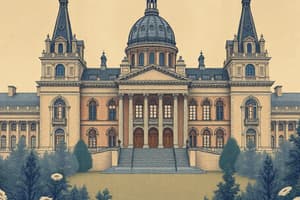Podcast
Questions and Answers
What is the primary focus of political ideologies?
What is the primary focus of political ideologies?
- Set of beliefs about politics and government (correct)
- Types of government structures
- Global interactions among states
- Methods of campaigning
Which term describes organizations that represent specific ideologies and seek to gain power?
Which term describes organizations that represent specific ideologies and seek to gain power?
- Political parties (correct)
- Political action committees
- Government structures
- Interest groups
What is a characteristic feature of a federal system of government?
What is a characteristic feature of a federal system of government?
- Concentration of power in a single central authority
- Division of power between central and regional authorities (correct)
- Uniform policy implementation across regions
- Absence of regional authorities
Which stage in the public policy process involves analyzing and implementing decisions?
Which stage in the public policy process involves analyzing and implementing decisions?
What aspect of global politics emphasizes cooperation and human rights?
What aspect of global politics emphasizes cooperation and human rights?
How does political participation mainly manifest in a democracy?
How does political participation mainly manifest in a democracy?
Which component is NOT part of the election process?
Which component is NOT part of the election process?
What is the primary goal of studying political literacy?
What is the primary goal of studying political literacy?
Flashcards are hidden until you start studying
Study Notes
Definition of Political
- Related to the activities, actions, and policies used to gain and hold power in government or to influence the government.
Key Concepts
-
Political System
- Framework of political institutions, practices, and processes.
- Types: democracy, authoritarianism, totalitarianism, monarchy, oligarchy.
-
Political Ideologies
- Set of beliefs about politics, society, and the role of government.
- Major ideologies: liberalism, conservatism, socialism, libertarianism, nationalism.
-
Political Parties
- Organizations that represent specific ideologies and seek to gain power.
- Functions: mobilize voters, develop policy agendas, provide electoral candidates.
-
Election Process
- Mechanism through which citizens choose representatives.
- Key components: primaries, general elections, voting methods, electoral systems (e.g., first-past-the-post, proportional representation).
-
Government Structures
- Branches of government: executive, legislative, judicial.
- Federal vs. unitary systems: distribution of power between central and regional authorities.
-
Public Policy
- Decisions and actions taken by government to address societal issues.
- Stages: agenda setting, formulation, adoption, implementation, evaluation.
-
Political Participation
- Engaging in activities that influence government and politics.
- Methods: voting, campaigning, activism, lobbying, public discourse.
-
Global Politics
- Interactions among states and non-state actors on a global scale.
- Key concepts: sovereignty, diplomacy, international organizations (e.g., UN, NATO), globalization.
Current Trends
- Rise of populism.
- Increased polarization in political opinions.
- Influence of social media on political engagement and information dissemination.
- Global challenges: climate change, migration, inequality affecting political decision-making.
Political Theories
-
Realism
- Focus on power and national interest in international relations.
-
Liberalism
- Emphasis on cooperation, international institutions, and human rights.
-
Constructivism
- Importance of ideas, beliefs, and identities in shaping political actions.
Importance of Political Literacy
- Understanding political systems aids in informed voting and civic engagement.
- Critical thinking about political information can reduce misinformation and enhance discourse.
Definition of Political
- Refers to the methods and strategies used to gain and maintain power within a government or influence government decisions.
Political System
- A framework that includes institutions, practices, and procedures involved in governing a society.
- Examples of political systems include democracies, authoritarian regimes, totalitarian states, monarchies, and oligarchies.
Political Ideologies
- A set of beliefs and values that guide political thought and actions regarding society and government.
- Examples of major political ideologies include liberalism, conservatism, socialism, libertarianism, and nationalism.
Political Parties
- Organizations that advocate for specific political ideologies and aim to gain power within a government.
- They play a role in mobilizing voters, shaping policy agendas, and providing candidates for elections.
Election Process
- The process by which citizens elect their representatives.
- Key components include primary elections, general elections, voting procedures, and electoral systems such as first-past-the-post or proportional representation.
Government Structures
- Governments are usually divided into branches: executive, legislative, and judicial.
- Power can be distributed between central and regional authorities, creating federal or unitary systems.
Public Policy
- Decisions and actions taken by governments to address social issues.
- Public policy involves multiple stages: agenda setting, policy formulation, adoption, implementation, and evaluation.
Political Participation
- Individuals can engage in activities that impact government and politics.
- Examples include voting, campaigning, activism, lobbying, and public discourse.
Global Politics
- Interactions between states and non-state actors on a global scale.
- Key concepts include sovereignty, diplomacy, international organizations (e.g., UN, NATO), and the impact of globalization.
Current Trends
- The rise of populism as a political force.
- Growing polarization in political opinions.
- The influence of social media on political engagement and the dissemination of information.
- Global challenges such as climate change, migration, and inequality impacting political decision-making.
Political Theories
- Realism: Focuses on power and national interest in international relations.
- Liberalism: Emphasizes cooperation, international institutions, and human rights.
- Constructivism: Highlights the role of ideas, beliefs, and identities in shaping political actions.
Importance of Political Literacy
- Understanding political systems is crucial for informed voting and civic engagement.
- Critical thinking about political information helps to reduce misinformation and promote constructive political discourse.
Studying That Suits You
Use AI to generate personalized quizzes and flashcards to suit your learning preferences.




